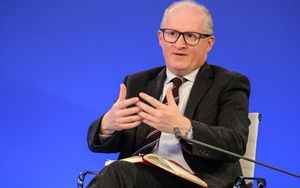(Ticker) – “We expect more hikes to be needed, but much has already been doneso we will need to make sure we have a good understanding of the inflation outlook and risk factors when setting rates meeting by meeting.” He said Philip Lane, Chief Economist and member of the Executive Board of the ECB, in an interview with Milano Finanza. Looking back to the European Central Bank meeting in December, the economist stressed that “the starting point is different now”, with Frankfurt having already raised rates by 200 basis points. “We will still be guided by the inflation outlook – he explained – But in no meeting can the appropriate amount of the increase be decided without consider the starting pointwhich is now much higher than in previous meetings.”
Lane did not explicitly advocate a new half-percentage point tightening, rather than another 75 basis point increase, but he said: “The higher starting point is one dimension of the debate, but of course in broader terms we will need to look at the overall outlook.I mean when we make future rate decisions, including in December, we will need to consider the scope of what we have already done, so the basis for the decision will be different“.
Regarding the evolution of consumer prices, Lane said that “passed the initial months, going later in 2023in spring or summer, we should see a significant drop in the inflation rate. That said, the path of inflation from the current very high levels to 2% will still take time.”
However, the Chief Economist of the ECB warned about the “second round of inflation“. “Many sectors have to raise prices because their costs have grown – he explained – It is also true that many workers have suffered a sharp reduction in living standards, but we expect them to receive higher salary increases next year and also in 2024 and 2025. These increases will support spending and also raise prices. This is the reason why it will take some time to get back to the 2% target. Second-level effects will drive inflation next year and into 2024.”
Lane also reiterated what President Christine Lagarde had argued in recent weeks, namely that more expansionary policies by governments could push the ECB to raise rates more. “If the euro area runs larger fiscal deficits, this will increase overall demand in the economy and thus imply higher rates to ensure that inflation returns to 2% – he argued – Therefore we stressed that in the immediate response to the energy crisis, governments still have to do a lot, protect the most vulnerable and offer support to companies that face particular challenges. It is useful to intervene in a temporary and targeted way rather than overfeeding aggregate demand on a permanent basis”.
